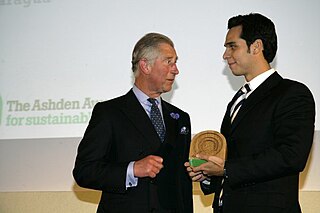
Ashden is a London-based charity that works in the field of sustainable energy and development. Its work includes the annual Ashden Awards, advocacy and research in the field of sustainable energy, and mentoring and practical support for award winners.

Acumen is a nonprofit impact investment fund focused on investing in social enterprises that serve low-income individuals in the United States. Acumen was founded in April 2001 by Jacqueline Novogratz. It aims to demonstrate that small amounts of philanthropic capital, combined with business acumen, can result in thriving enterprises that serve vast numbers of the poor. Over the years, Acumen has invested $115 million in 113 companies and has had a successful track record in sourcing and executing investment opportunities in the clean energy, health care and agriculture sectors.
Google.org, founded in October 2005, is the charitable arm of Google, a multinational technology company. The organization has committed roughly US$100 million in investments and grants to nonprofits annually.

Jeremy Leggett is a British social entrepreneur and writer. He founded and was a board director of Solarcentury from 1997 to 2020, an international solar solutions company, and founded and was chair of SolarAid, a charity funded with 5% of Solarcentury's annual profits that helps solar-lighting entrepreneurs get started in Africa (2006–2020). SolarAid owns a retail brand SunnyMoney that was for a time Africa's top-seller of solar lighting, having sold well over a million solar lights, all profits recycled to the cause of eradicating the kerosene lantern from Africa.

The developing nations of Africa are popular locations for the application of renewable energy technology. Currently, many nations already have small-scale solar, wind, and geothermal devices in operation providing energy to urban and rural populations. These types of energy production are especially useful in remote locations because of the excessive cost of transporting electricity from large-scale power plants. The applications of renewable energy technology has the potential to alleviate many of the problems that face Africans every day, especially if done in a sustainable manner that prioritizes human rights.

Harish Hande is an Indian social entrepreneur, who co-founded SELCO India in 1995. He was awarded with the Ramon Magsaysay Award for 2011 for "his pragmatic efforts to put solar power technology in the hands of the poor, through his social enterprise SELCO India".
Low Carbon Communities (LCC) is one part of Marches Energy Agency; a leading climate change and sustainable energy social enterprise and a registered charity, based in the West Midlands, England.
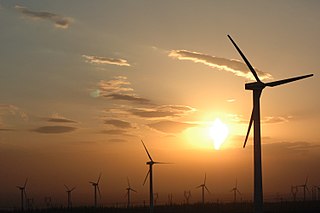
Renewable energy in developing countries is an increasingly used alternative to fossil fuel energy, as these countries scale up their energy supplies and address energy poverty. Renewable energy technology was once seen as unaffordable for developing countries. However, since 2015, investment in non-hydro renewable energy has been higher in developing countries than in developed countries, and comprised 54% of global renewable energy investment in 2019. The International Energy Agency forecasts that renewable energy will provide the majority of energy supply growth through 2030 in Africa and Central and South America, and 42% of supply growth in China.
Bioregional is an entrepreneurial charity, which aims to invent and deliver practical solutions for sustainability. It was founded in 1992 on the belief that overconsumption of resources was the driving force behind environmental degradation, and set out to find new ways to meet more of their needs from local resources.
Sunlabob Renewable Energy is a Lao commercial company that provides sustainable renewable solutions to areas that are off the electrical grid. It was licensed in 2001 and its headquarters and base are in Vientiane, the capital of the Democratic People's Republic of Laos. The company operates as a profitable, full-service renewable energy provider selling hardware and providing commercially viable energy services.
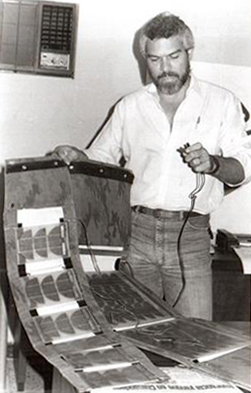
ECAMI is a renewable energy business based in Nicaragua, focusing on solar photovoltaics, wind power and hydroelectric system.
Innovation: Africa is a non-profit 501(c)(3) organization which brings Israeli solar, water and agricultural innovations to rural African villages. Since its establishment in 2008, the organization has completed over 880 projects providing light and solar energy to schools and medical centres and crucially, pumping clean water to more than 4 million people across 10 African countries. Innovation: Africa maintains headquarters in the US and Israel and has projects across Uganda, Malawi, Tanzania, Zambia, South Africa, Cameroon, Ethiopia, the Democratic Republic of Congo, Senegal, and Eswatini.
E+Co is a non-governmental organization based in Bloomfield, New Jersey, United States, that from its founding in 1994 to its restructuring in 2012 made over 250 clean energy investments in developing countries. Over these 18 years, E+Co maintained field offices in San Jose, Costa Rica, Bangkok, Thailand, Dar es Salaam, Tanzania and Accra, Ghana. The company's name is pronounced, "E and Co".
WakaWaka is a global social enterprise that developed and sold portable solar products for people without access to electricity. The company was founded in 2012 by Maurits Groen and Camille van Gestel. WakaWaka means “shine bright” in Swahili. For every WakaWaka purchased, one solar light was donated to a family living without access to electricity. In July 2018 TSM Business School took over the brand name and the remaining stocks of WakaWaka, after the enterprise went bankrupt after failing to raise EUR 2.5 million in growth capital.
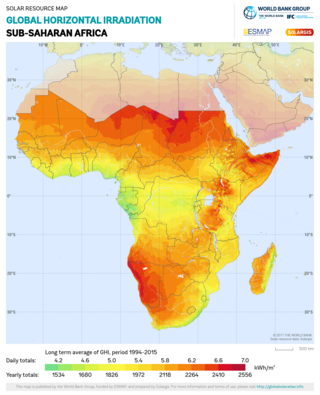
Africa is often considered and referred as the "Sun continent" or the continent where the Sun's influence is the greatest. According to the "World Sunshine Map", Africa receives many more hours of bright sunshine during the course of the year than any other continent of the Earth: and many of the sunniest countries on the planet are in Africa.
The LuminAID is a solar-rechargeable light that packs flat and inflates to diffuse light like a lantern. LuminAID technology was invented in 2010 by Anna Stork and Andrea Sreshta.

The Hult Prize is an annual, year-long competition that crowd-sources ideas from university level students after challenging them to solve a pressing social issue around topics such as food security, water access, energy, and education. It was founded by a group of Hult International Business School MBAs and is funded by Bertil Hult, the latter of whom, along with his family – founders of EF Education First – donates US$1 million in seed capital to help the winning team launch a social enterprise.
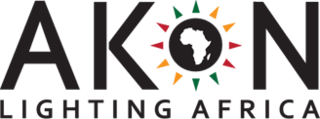
Akon Lighting Africa is a project started in 2014 by music artist Akon with Samba Bathily and Thione Niang which aims to provide electricity by solar energy in Africa. Their initial technique is to install solar street lights and small energy systems.
PEG Africa is a for profit corporation, financing and deploying solar power to households and SMEs in West Africa. The company provides loans for pay-as-you-go (PAYG) solar power home systems and solar water irrigation to customers that do not have access to an electrical grid. The loans are repaid by customers in small increments, using mobile payments. The solar power home systems can be used by customers as collateral for loans on further products and services.

The Stichting IKEA Foundation is a Dutch foundation founded in 1982 by Ingvar Kamprad, a Swedish billionaire and founder of IKEA. The foundation receives its income from the Stichting INGKA Foundation. Initially focused on architecture and interior design, its scope expanded in 2009 to include "improving children's opportunities". In 2020, total grants disbursed by the foundation amounted to $220.67 million.











